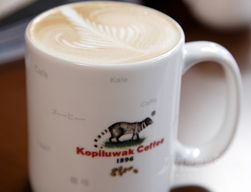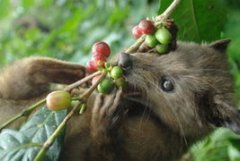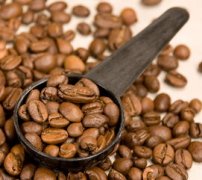How the production of Kopi Luwak brews Kopi Luwak
Manufacturing method
The roasting process of Luwak coffee beans:
1. Civets like to eat red coffee fruits that are ripe on coffee trees.
2. Pick out undigested coffee seeds from cat droppings
3. Remove the silver gray film of coffee seeds, wash them with water and dry them in the sun.
4. Luwak coffee beans are made by stir-frying.
Production skills
1. After Indonesians remove the silver-gray film on the appearance of coffee beans, wash them with water, dry them in the sun, and then stir-fry them, they become cat shit coffee beans.
2. Only about 150 grams of coffee beans can be extracted from a jin of civets' feces, which will cause 20% loss in the roasting process. Due to the unique raw materials and production process, this kind of coffee can be said to be very rare. No more than 400 kilograms of coffee beans are supplied worldwide every year.
3. Traditionally, coffee fruit is washed or sun-treated to remove excess parts and take out coffee beans, but Luwak obtains coffee beans by using its natural fermentation in civets, so it has a unique flavor.

The aroma of Kopi Luwak is easier to lose than ordinary coffee. In order to maintain the flavor, coffee beans should be packaged independently and then injected with nitrogen to prevent the oxidation of coffee beans. The production process is complicated and rigorous. If you want to enjoy the true taste of Kopi Luwak, do not add sugar or milk to your coffee. It is recommended to use an air stopper (Siphon siphon), add 160g / 180ml (ml) of pure water, pour 17g (grams) of coffee powder with about 2 flat spoons of coffee, and gently press down the raised coffee powder with flat bamboo slices after the water boils up. Remember! Do not stir, otherwise the coffee will become bitter, sour and astringent.
The water temperature is 96 ℃, the water pressure is 9-10atm, boil for about 1 minute 45 seconds ~ 2 minutes, quickly remove the fire source and wipe the glass bottle with a cold wet cloth to make it cool rapidly, the brewed coffee will quickly fall and show a large number of golden fine foam, so that the ultimate flavor can be achieved. In the general way of brewing, some people say that civet coffee can be brewed for 2 or 3 times, but the above brewing method is regarded as the essence after boiling for a long time, so rebrewing is not recommended.
The aroma of Kopi Luwak is easier to lose than ordinary coffee. In order to maintain the flavor, coffee beans should be packaged independently and then injected with nitrogen to prevent the oxidation of coffee beans. The production process is complicated and rigorous. If you want to enjoy the true taste of Kopi Luwak, do not add sugar or milk to your coffee. It is recommended to use an air stopper (Siphon siphon), add 160g / 180ml (ml) of pure water, pour 17g (grams) of coffee powder with about 2 flat spoons of coffee, and gently press down the raised coffee powder with flat bamboo slices after the water boils up. Remember! Do not stir, otherwise the coffee will become bitter, sour and astringent.
The water temperature is 96 ℃, the water pressure is 9-10atm, boil for about 1 minute 45 seconds ~ 2 minutes, quickly remove the fire source and wipe the glass bottle with a cold wet cloth to make it cool rapidly, the brewed coffee will quickly fall and show a large number of golden fine foam, so that the ultimate flavor can be achieved. In the general way of brewing, some people say that civet coffee can be brewed for 2 or 3 times, but the above brewing method is regarded as the essence after boiling for a long time, so rebrewing is not recommended.
The aroma of Kopi Luwak is easier to lose than ordinary coffee. In order to maintain the flavor, coffee beans should be packaged independently and then injected with nitrogen to prevent the oxidation of coffee beans. The production process is complicated and rigorous. If you want to enjoy the true taste of Kopi Luwak, do not add sugar or milk to your coffee. It is recommended to use an air stopper (Siphon siphon), add 160g / 180ml (ml) of pure water, pour 17g (grams) of coffee powder with about 2 flat spoons of coffee, and gently press down the raised coffee powder with flat bamboo slices after the water boils up. Remember! Do not stir, otherwise the coffee will become bitter, sour and astringent.
The water temperature is 96 ℃, the water pressure is 9-10atm, boil for about 1 minute 45 seconds ~ 2 minutes, quickly remove the fire source and wipe the glass bottle with a cold wet cloth to make it cool rapidly, the brewed coffee will quickly fall and show a large number of golden fine foam, so that the ultimate flavor can be achieved. In the general way of brewing, some people say that civet coffee can be brewed for 2 or 3 times, but the above brewing method is regarded as the essence after boiling for a long time, so rebrewing is not recommended.
Important Notice :
前街咖啡 FrontStreet Coffee has moved to new addredd:
FrontStreet Coffee Address: 315,Donghua East Road,GuangZhou
Tel:020 38364473
- Prev

The reason why Kopi Luwak is so expensive is the characteristics of Kopi Luwak
Coffee beans generally go through the process of shell fermentation, coffee beans in the civets' intestines, special bacteria provide a unique fermentation environment, the flavor becomes unique, particularly thick and mellow. The coffee beans fermented by civets' intestines and stomach are very thick and mellow. Kopi Luwak was once a tribute from Indonesia to the Dutch royal family. At that time, the industry regarded this kind of coffee in the name of cat shit as a kind of
- Next

How can coffee beans choose the seven steps to choose good coffee beans
Coffee has become a necessity in people's life. Some people choose instant coffee for fear of trouble, while others insist on using coffee beans for fresh grinding. So how to choose and buy coffee beans becomes the key. 1. See whether the preservation environment is proper or not. When buying coffee beans, look at the preservation of coffee beans, coffee beans are easy to oxidize and should be stored in an environment free from sunlight and low temperature and humidity.
Related
- Beginners will see the "Coffee pull flower" guide!
- What is the difference between ice blog purified milk and ordinary milk coffee?
- Why is the Philippines the largest producer of crops in Liberia?
- For coffee extraction, should the fine powder be retained?
- How does extracted espresso fill pressed powder? How much strength does it take to press the powder?
- How to make jasmine cold extract coffee? Is the jasmine + latte good?
- Will this little toy really make the coffee taste better? How does Lily Drip affect coffee extraction?
- Will the action of slapping the filter cup also affect coffee extraction?
- What's the difference between powder-to-water ratio and powder-to-liquid ratio?
- What is the Ethiopian local species? What does it have to do with Heirloom native species?

